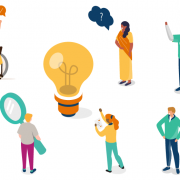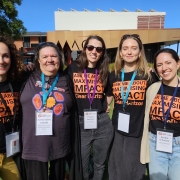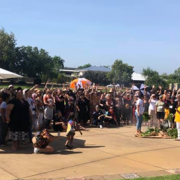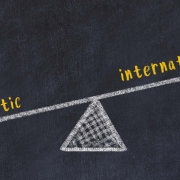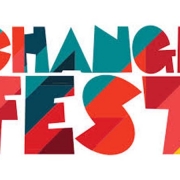Let’s bridge the cultural divide: why evaluation and anthropology need each other
Research Analyst Alessandra Prunotto reflects on the Australian Anthropological Society conference, 2-5 December 2019.
This year’s Australian Anthropological Society conference in Canberra was themed “Values in anthropology, values of anthropology”. With this focus on values, you might assume that there would be a panel on evaluation, or at least a paper or two.
But there wasn’t.
How is this possible? I thought. After all, anthropology and evaluation are disciplines that overlap significantly.
Socio-cultural anthropology is the study of human societies in their environments. And evaluation is the practice of ascribing value to an initiative that’s creating change within a socio-environmental system. So at an anthropology conference on values, some debates on the thorny issues in evaluation practice seemed like par for the course.
But this was not the case. Instead, the undercurrent of concern that permeated the conference was the value that anthropology as a discipline has to those outside academia.
I suspect the conference theme of “value” manifested in this way because the majority of attendees were academics or PhD students. I believe that some of these intellectuals are struggling to understand the meaning of their work in a world where the pursuit of knowledge for its own sake is seen as retreating into an ivory tower.
As I listened to the various discussions circulating around “applied” and “public” anthropology, I noted down the themes emerging around the principles and skills that anthropology can offer the world beyond academia.
Looking around at the work we’re doing at Clear Horizon, I believe anthropology has much to offer evaluation.
In what follows, I expand on the ways that anthropological perspectives can help us navigate emerging trends in evaluation practice, as we see change-making initiatives move towards systems-change approaches and as cultural safety becomes essential for evaluation in First Nations contexts.
Anthropology’s superpowers
What are anthropology’s strengths, in comparison with other social sciences? At the conference, I noticed several themes emerging that painted a picture of applied anthropology done well.
Understanding of the other. As the comparative study of human societies, anthropologists intend to understand other people’s perspectives, no matter how radically different. This requires you to listen deeply and attentively, with humility. You aim to learn and empathise before reflecting critically.
Challenging assumptions. With an awareness that your way of being and thinking is one of many, anthropology compels you to question your own assumptions, as well as that of others. Anthropology is a critical discipline that aims to surface the most fundamental aspects of different worldviews and value systems.
Bringing together different worlds. As the goal of anthropology is to bridge cultural divides, it gives you the foundation to bring together different stakeholders, creating a space for different voices and perspectives to come together. It helps you to find zones where mutual understanding can flourish.
Reflexivity and awareness of power dynamics. Sharpening your observation skills and handing you a toolkit of theorists from Fanon to Foucault, anthropology enables you to identify power dynamics and maintain an awareness of your own position within them.
Contextualisation and comfort with complexity. Anthropology aims to understand human behaviour and beliefs within a broader social, historical, environmental and political context. It asks you to embrace messiness and complexity, and avoid reductive explanations.
Anthropology in systems-change evaluation
Across the change-making sector, we’re seeing a move away from programs and towards systems-change initiatives, such as place-based and collective impact approaches.
A number of elements that characterise these approaches heighten the complexity required of evaluation practice. These elements include the increased number and diversity of stakeholders involved, long timeframes, the range of changes initiated and the difficulties in identifying how initiatives contribute to certain outcomes.
As we can see from the list above, anthropological training leaves you well-placed to tackle these kinds of evaluations.
It allows you to bring together diverse stakeholders and facilitate the negotiations between different value systems and worldviews. It helps you to understand and manage the power relations that might exist between these different groups. And sitting with the complexity of the work is a sign that you’re dealing with the reality of change, not boxing it down into something that is both manageable and fictional.
Anthropology in First Nations evaluation
Attitudes in relation to First Nations evaluation are changing. At Clear Horizon, we’re hearing more compelling demands for decolonising evaluation and power-sharing. A merely participatory and inclusive approach to evaluating with First Nations peoples is no longer acceptable – instead, evaluation needs to be conducted by First Nations peoples “as” First Nations peoples, a principle that is underpinned by the rights of Indigenous peoples in the UNDRIP.
Anthropological perspectives have much to offer to help non-Indigenous evaluators collaborating with First Nations peoples navigate these issues sensitively and appropriately.
Most importantly, anthropology can provide a means to understand that hegemonic practices in evaluation and change-making are not the only ways of working, nor are they necessarily the right ones. Furthermore, anthropological perspectives can foreground how histories of colonisation can continue to manifest in power relations and structural disadvantage today. These aspects of anthropology can lend the humility needed to truly shift evaluative practice back to First Nations peoples and communities who have the expertise to evaluate in their own context.
Bridging the divide
It’s clear that anthropology can bring important skills and perspectives to the emerging trends in evaluation practice.
But it seems that evaluation is not on the radar as a potential career for anthropology students. As I’ve highlighted, it was not even mentioned at the most recent annual conference, despite the focus on “value” and a more public anthropology. And from my own experience, having graduated from an anthropology degree just last year, I’d never heard evaluation mentioned as a potential career path.
What can we do to bring evaluation and anthropology together?
One option might be a partnership, or at least more dialogue, between the Australian Evaluation Society and anthropology departments. Local chapters of the AES might have the potential to run careers information talks, mentorships, or even graduate placement programs.
Perhaps advertisements for evaluation positions could specifically mention that anthropology graduates are welcome in the list of disciplinary backgrounds accepted.
But the skills and ideas of anthropology should not just be limited to those who studied it at university. There could also be an opportunity for anthropologists to run training for evaluators who come from disciplines more removed from anthropology, to upskill them for these emerging areas of work.
Evaluation and anthropology have the potential to achieve more impact together. Evaluation can benefit from the nuanced, critical perspectives anthropology can bring. And anthropologists are seeking ways to make themselves useful outside universities.
Let’s reach out.


